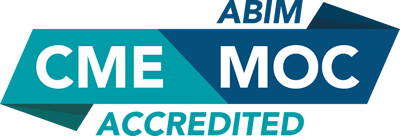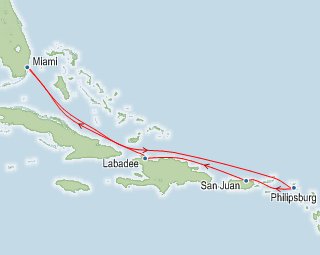
COURSE CREDITS & HOURS
14 AMA PRA Category 1 Credits™14 ACPE Credits
14.0 Contact Hours
14 (part II) MOC points in medical knowledge in the American Board of Internal Medicine's (ABIM) Maintenance of Certification (MOC) program
5½ Hours of Pharmacology for NPs
COURSE FEES
TARGET AUDIENCE
PROGRAM PURPOSE
- Hospital Medicine Literature Highlights - Cardiology, Cancer, Nephrology
- Upon completion of this activity, attendees should be able to describe key updates & current literature related to the modern practice of hospital medicine.
- Hospital Medicine Literature Highlights 2 - Infectious Disease, Pulmonary Disease, Rheumatology
- Upon completion of this activity, attendees should be able to describe key updates & current literature related to the modern practice of hospital medicine.
- Tick Borne Diseases
- Upon completion of this activity, attendees should be able to recognize key clinical features of tick borne diseases.
- Test Interpretation and Medical Decision Making
- Upon completion of this activity, attendees should be able to interpret medical test results in a scientific manner.
- Venous Thrombosis and Pulmonary Embolism - prophylaxis and treatment
- Upon completion of this activity, attendees should be able to describe the current standard of care for prophylaxis and treatment of venous thrombosis in a hospitalized patient.
- Special Considerations for the Geriatric Patient
- Upon completion of this activity, attendees should be able to describe key treatment considerations for geriatric inpatients.
- Sepsis and Shock
- Upon completion of this activity, attendees should be able to describe the current state of sepsis recognition and treatment, in accordance with widely accepted published guidelines.
- Headache
- Apply acute migraine medications
- Discuss the different clinical signs and symptoms of various tTrigeminal autonomic cephalgia
- Diagnose and manage chronic migraine and medication overuse headache
- Seizures
- Use of antiepileptic drugs in the treatment of seizures
- Identify patients nonepileptic behavioral disorders
- Assess patients presenting with their first seizure
- Multiple sclerosis
- Discuss the indications and side effects of the current and most imminent therapies for MS
- Summarize current and emerging imaging techniques in the diagnosis and treatment of MS
- Counsel a patient with MS about reproductive issues
- Dementia
- Recognize the key features for the diagnosis of Alzheimers disease, vascular dementia, and frontotemporal dementia
- Identify the appropriate use of CSF and imaging biomarkers in clinical dementia diagnosis
- Use appropriate phamacologic and non pharmacologic approaches for the management of patients with dementia
- Stroke
- Provide an overview of emergent evaluation of a stroke patient
- Summarize the recommendations for management of hypertension, physical activity, dyslipedemia, diabetes mellitus, diet, and lifestyle
- Discuss the antiplatelet and antithrombotic therapies
- Movement disorders
- Recognize the key features associated with the most common movement disorders
- List the clinical features distinguishing essential tremor form cerebellar tremor from Parkinson&apost;s tremor
- List the cognitive, behavioral and sensory manifestations associated with tics in Tourettte syndrome and related disorders
- Sleep
- Discuss the core science concepts of sleep wake regulation
- Discuss the underlying neurochemistry and pathophysiology of major sleep disorders
- Apply strategies for diagnosis and assessment of patients with common disturbances








































